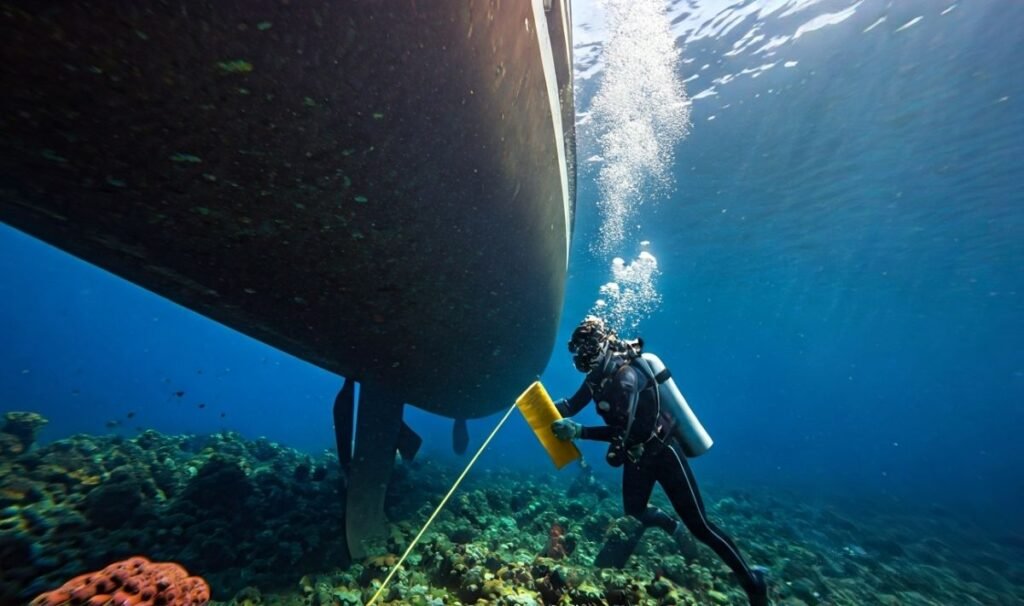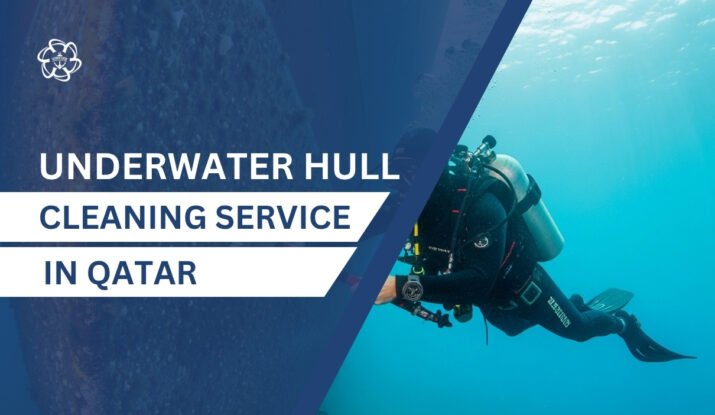Underwater Hull Cleaning in Qatar, maintaining a vessel begins with effective crucial for operators, especially in Qatar. At Ras Laffan Port, expert services remove biofouling like algae and barnacles, which can slow ships and hinder performance.
Regular hull cleaning reduces fuel consumption and ensures compliance with environmental regulations. By minimizing fouling, operators enhance speed and prepare their vessels for any journey. Interested in the cleaning process? Let’s explore it further.
Key Steps in Professional Underwater Hull Cleaning in Qatar
Underwater hull cleaning in Qatar is a step-by-step process that helps vessel operators maintain efficiency. In Ras Laffan, divers or advanced ROVs first assess the level of biofouling on key areas of the hull. They utilize modern techniques to remove marine growth while adhering to local port regulations.
Next, they select appropriate tools, including brushes, scrapers, or water jets. Professional divers clean the hull carefully to protect coatings and minimize disturbance to marine life. This thorough process ensures optimal vessel performance.
Inspection and Assessment of the Vessel Hull
Every expert hull cleaning job begins with a thorough inspection of the vessel’s hull. At Ras Laffan Port, teams utilize underwater survey tools to assess fouling levels. Divers equipped with CCTV cameras capture real-time video of areas affected by algae, barnacles, or mussels, enabling effective maintenance planning.

These inspections go beyond technical tools; they empower vessel operators to make informed decisions for upcoming cleanings and maintenance. Detailed footage ensures that even hard-to-reach spots are addressed, reducing the risk of overlooking fouling patches.
At Ras Laffan Port, findings from each underwater assessment guide the cleaning process, ensuring compliance with international standards. With professional surveying methods and advanced tools, vessel operators gain a comprehensive view of the hull, facilitating organized maintenance planning and providing peace of mind. In the next section, we will discuss the primary hull cleaning methods.
Advanced Techniques and Equipment Used for Underwater Hull Cleaning in Qatar
Expert Underwater Hull Cleaning in Qatar employs advanced tools and methods tailored to vessel size and fouling extent. For light fouling, robotic ROVs are used, achieving cleaning speeds of 50m² to 200m² per hour. Heavier fouling requires divers with specialized gear to effectively remove marine growth without damaging the hull or coatings.
Propeller polishing is also crucial for enhancing performance. A polished propeller has a smoother surface, reducing turbulence and improving fuel efficiency. The appropriate polishing method is determined based on the vessel’s operations and hull survey results.
| Equipment/Method | Details |
|---|---|
| Brushes and Scrapers | Stainless steel or nylon tools for algae and barnacle removal. |
| Water Jets | High-pressure systems for rapid cleaning of larger fouling clusters. |
| ROVs | Remote-operated vehicles designed for efficient deep-water cleaning. |
These tools ensure that vessels in Qatar remain in optimal condition and comply with environmental regulations.
Benefits of Expert Underwater Hull Cleaning in Qatar for Ships
Professional hull cleaning services in Qatar assist marine engineers and vessel operators by removing fouling from hulls, reducing fuel consumption, and improving vessel performance. Some providers offer fast, instant-response cleaning, minimizing downtime at Ras Laffan Port.
Expert cleaners prevent long-term hull damage, protect coatings, and quickly eliminate marine growth. This leads to enhanced efficiency and longer intervals between maintenance. For improved performance and regulatory compliance, rely on these hull cleaning services.
Improved Vessel Efficiency and Fuel Savings
Hull cleaning enhances a ship’s performance and reduces fuel consumption. When barnacles and algae cover the hull, they create drag, slowing the vessel and increasing strain. Cleaning these organisms allows ships to move more efficiently, conserving fuel, even for larger vessels.
The benefits of hull cleaning are evident in key metrics like speed logs. Fouling can obstruct sensors such as sonar, leading to inaccurate navigation readings. Post-cleaning, biofouling removal ensures accurate data, allowing operators to maintain smooth operations.
Increased efficiency from hull cleaning translates to financial benefits: reduced fuel costs and fewer maintenance issues lead to higher profits. Vessel operators in Qatar, particularly at Ras Laffan Port, can achieve significant gains in efficiency and cost control through this simple practice. Next, we will discuss regulatory compliance.
Compliance with Environmental and Port Regulations
Environmental preservation is central to hull cleaning in Qatar. These initiatives protect ecosystems and build trust with global compliance groups. Using eco-friendly tools for barnacle removal and hull coating enables sustainable cleaning.
Ship managers benefit by staying compliant, resulting in fewer delays and reduced risk of fines. Ras Laffan and other regions enforce clear standards, making it essential to choose certified experts for hull cleaning services. Next, we will discuss the long-term effects of these services before concluding.
Conclusion
Expert underwater hull cleaning in Qatar is essential for optimal vessel performance and environmental compliance. The process begins with a thorough inspection of your hull, using advanced tools to maintain your ship’s condition. Regular cleaning reduces fuel consumption and extends the lifespan of your vessel, making it a wise choice for owners. Understanding the benefits and proper procedures empowers you to make informed decisions about your vessel’s care. To experience the advantages of professional underwater hull cleaning in Qatar, contact us for our expert services today!
FAQ:
Q1. How often should underwater hull cleaning in Qatar be performed in Qatar?
In Qatar, vessel operators must arrange underwater hull cleaning every 6 to 12 months, depending on fouling, vessel size, and location. At Ras Laffan Port, quick underwater hull cleaning services remove algae, barnacles, and other fouling, ensuring optimal ship performance and fuel efficiency.
Q2. What safety measures are followed during hull cleaning?
Hull cleaning safety begins with divers using CCTV systems for real-time monitoring, ensuring quality work. The team wears protective gear and conducts thorough underwater inspections to safeguard both the hull and personnel. Each task adheres to international safety standards, making hull cleaning effective and safe.
Q3. Can underwater hull cleaning in Qatar be done while the vessel is docked?
Yes, underwater hull cleaning can be performed while a vessel is at Ras Laffan Port. Cleaning teams employ advanced methods for quick and efficient cleaning, minimizing vessel downtime and ensuring optimal performance.
Q4. Are eco-friendly cleaning methods available in Qatar?
Eco-friendly hull cleaning is offered in Qatar by companies methods comply with IMO regulations and utilize non-damaging tools that protect the hull’s coating, aiding marine engineers. This allows for effective cleaning without harming marine life.
Q5. How does professional hull cleaning impact long-term maintenance costs?
Professional hull cleaning helps ship managers save money by protecting hull coatings and removing marine growth. A clean hull and propeller reduce fuel consumption, regardless of the ship’s size, leading to lower repair and fuel costs. Proper maintenance also extends the ship’s operational lifespan.


